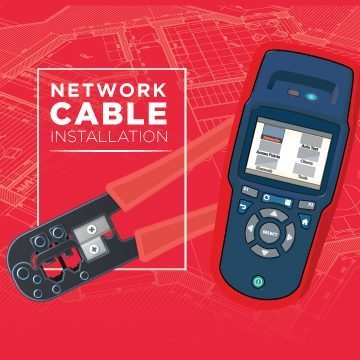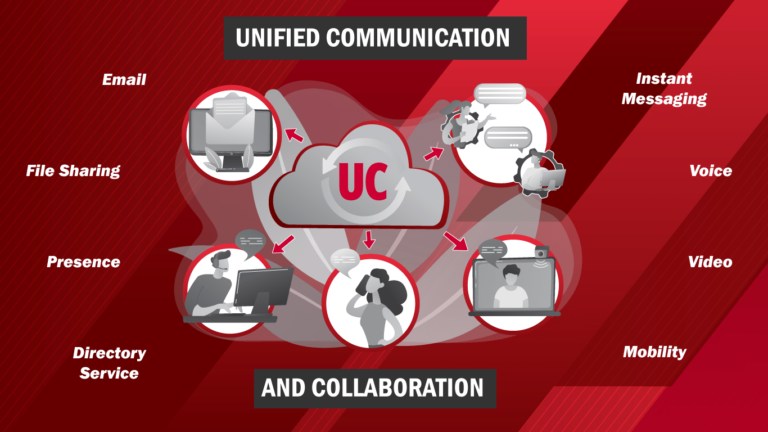Businesses rely on telecom services to keep their operations running smoothly by communicating with vendors, buyers, remote offices, service providers, and between internal company officers and employees. Telecommunication companies like Bell Labs and Vonage advanced telecom technologies significantly, making room for numerous other startups to contribute additional expertise. Phone, computer, and fax services now transmit data that before confined itself to a written page. These telecom services can include Time Division Multiplexing (TDM), Private Branch Exchange (PBX), or Voice over Internet Protocol systems (VoIP services). Business telecommunications services include traditional landline phone systems, private branch exchanges, data networks, video conferencing platforms, voice calls, and more. Top tier business telecommunications allow companies to provide secure communications and improve incoming customer calls.
1. VoIP Telecommunications Service
Voice over Internet Protocol (VoIP) is a popular telecom option that uses an internet connection over telephone (IP telephony). This internet-based technology provides VoIP phone calls and VoIP data communications cost-effectively beyond any traditional phone service provider.1 VoIP phones allow enterprises to use the same headset or hardware already in use with their computer and avoid additional costs from setting up a separate telephone line.
Why use a VoIP Service?
There are several reasons why an enterprise should consider the use of VoIP services for their communication needs.
- VoIP is cost-effective, using the internet to transmit calls to save companies money on long-distance and international calls.
- Voice over IP provides advanced features, including call forwarding, voicemail, and video conference calling. These advanced features improve productivity and collaboration among team members.
- VoIP is flexible and scalable, allowing businesses to add or remove users easily according to corporate needs.
- VoIP is easy to set up and maintain, making it a widespread choice for companies large and small.
- No hardware to purchase, install, manage, or replace.

Enterprises can quickly transfer phone numbers between locations to keep important marketing and sales numbers always active. The “porting” of a fixed number allows greater flexibility to growing companies to move a telecom phone line anywhere in the network anytime. Since VoIP routes a call through the same Internet connection, your business communications are less susceptible to public power outages and other breaks in service, whether local or long distance. VoIP provides telephone service access solutions globally.
VoIP Service Versatility
Voice-over IP technology offers personal and business services, making it an excellent option for those looking to cut back on phone expenses without sacrificing quality or features. Fifth, VoIP provides high-quality audio, making conversations more understandable and efficient. Lastly, VoIP is secure and reliable, allowing businesses to maintain high confidentiality.
Wireless VoIP Solutions
Two decades ago, over 90 percent of U.S. adults lived in a home with an operational landline phone. Now, less than 30 percent of homes have a landline phone.2 Cellular analog phones (generation 1 or G1) brought commercial enterprises to a new level of communication with their field representatives. Digital phones (generation 2 or G2) accelerated telecommunications growth exponentially using frequency-shift keying (FSK). The FSK technology introduced two frequencies to transmit wireless messages.3 With the world transitioning to G5 technology, voice and data traffic can race back and forth with low latency. The development of mobile phones with VoIP or mobile VoIP (mVoIP) services takes internet telephony to a new level by combining the high speeds of the G5 network with the low cost of mVoIP and the superior speech comprehension provided by digital VoIP telecommunications over conventional mobile phone calls.4 Some telecom companies (Telco) bundle VoIP telecommunication services into a Unified Communications Solution to promote collaboration between teams. This type of service streamlines inter-office communications and simplifies external connections on any desktop or mobile device. Elevate UC is an example of a unified telecommunications service.

Top 12 VoIP Telecom Service Advantages
- Lower operating cost
- Scalability without additional hardware or purchasing more phone lines
- Supports remote employees
- Free or low-cost add-on features: call transfer, group ringing, call queuing
- Flexibility with computers, tablets, or smartphone applications
- Auto attendant feature
- Call from anywhere
- Portable virtual number
- Web conference calls or multi-party calling
- Voice quality
- Send documents, images, and videos while engaged in voice conversation
- Feature-rich: call forwarding, call blocking, remote management, caller ID, voicemail, automatic call distribution, interactive voice recognition, instant messaging, and video sharing
VoIP Services Summary
VoIP telephone services make connecting and staying in touch with business colleagues, suppliers, and clients from any location easier. VoIP telephone solutions are accessible from wherever you are. Make and receive calls from anywhere in the world at any time. Additionally, user support and access are always available 24/7 with most VoIP services, making it an ideal way to connect and stay connected. VoIP services offer more flexibility than traditional phone lines.
2. PBX Telecom
PBX (Private Branch Exchange) is a telecommunication system that is the hub of an organization’s internal telephone network. It allows for the development of multiple internal connections, which helps reduce costs and improve efficiencies by avoiding using separate systems for different types of calls. PBX features services like call forwarding, voicemail, interactive voice response systems, and other features that help businesses manage their communications more effectively.
PBX for Optimizing Telecom Infrastructure
Tailoring PBX systems to an organization’s needs is a best practice for providing flexible services and cost-effective business telecommunications solutions for enterprises looking to optimize their telecom infrastructure. Integrating PBX systems with other technologies, such as VoIP (Voice over Internet Protocol) or cloud-based voice services, allows users to communicate seamlessly over multiple mediums. PBX systems improve productivity and lower their business overhead costs. Its easy setup, simple maintenance, and advanced features make it a perfect way to upgrade a business’s telecom infrastructure.

Top 12 PBX Telecom System Advantages
- Flexible call routing
- Centralized control to route incoming calls from a single number
- Automation feature for a simple menu system
- Variable access levels for internal calls, outgoing calls, and long-distance calls
- Provides a report of all incoming and outgoing calls
- Utilize cost control measures aided by reports
- Smartphone access
- Internet integration through VoIP
- Internal calls without fees
- Call history
- Music-on-hold
- Voicemail system
PBX Telephone Service Summary
A PBX phone system is an essential asset for any business. It helps to enable and streamline communication, improve customer service, and reduce operational costs. PBX features provide powerful call management capabilities that make it easier to manage calls, enhance call quality, improve call service, and track usage.
3. TDM Telecommunications
The first system, TDM, utilizes multiple telephone lines to allow simultaneous transmission of audio conversations via a digital network using packet switching. This digital communication uses multiplexing techniques to share limited band power among multiple users on a single line. Combining separate data streams into a single stream allows several conversations or transmissions to occur simultaneously over a single cable. This method makes it an efficient and cost-effective choice for telecom providers looking to offer reliable and secure communications without sacrificing speed or quality.
TDM Bandwidth and Security Support
TDM also offers fast data transfer speeds. Each user conversation or transmission takes up only a fraction of the telephone system, network, or total available bandwidth, so more transmissions can occur without sacrificing speed or quality. TDM allows transmitting and receiving telephone switches to create channels or tributaries within a communication stream. TDM also offers enhanced security features that prevent unauthorized access to transferred data. TDM combines two separate signals into one to provide encryption preventing external agents from tapping into conversations or data transmissions on the line. This improved security helps protect companies and individuals from eavesdropping and other cyberattacks.

Top 12 TDM Telecom System Advantages
- Dynamic coordination
- Works for both analog and digital signals
- Flexible and adaptable applications
- Simple hardware
- Efficient bandwidth
- High transmission speed
- Omits external impedance
- Efficient and reliable
- Reduced crosstalk
- No intermodulation disruption
- It does not require a carrier wave
- Data synchronization
TDM Summary
Time Division Multiplexing is a good option for telecom users who want reliable service without sacrificing speed or quality of connection while providing enhanced security levels. With its efficient use of existing bandwidth and its ability for faster data transfer speeds, TDM is quickly becoming the preferred choice for many telecom companies. This advancement is worthy of consideration to replace a public switched telephone network (PSTN).
Telephony Services
New technologies employed for business communications stimulate better transactions and enable greater productivity. Internet protocol or IP telephony involves installing special equipment such as PBX and digital key telephone systems to provide more efficient communication solutions for businesses. Internet telephony systems for in-office communications offer voicemail options, automated attendant operations, call forwarding capabilities, conference calling services, virtual faxing solutions, and more.
Telecommunications Service
With these different types of telecom services and digital communications available to enterprises today, businesses have more options to select the best solution for their company. Better communication with customers increases sales and productivity. Investing in these telecom services allows enterprises to benefit from improved communication efficiency and cost savings over time. Today’s digital technology enhances the use of a local area network (LAN) for building and office connectivity, a wide area network (WAN) for large geographical areas or long-distance coverage, or a metropolitan area network (MAN) for suburban or city telecommunications. Corporations can use the latest communication technologies and maintain connections with the right telecom equipment and service provider.
There is a Telecommunications Service and Provider out there that can help your company stay connected and productive. Wireless communications have gone beyond just business and are now essential for navigation, weather, emergency services, social life, and entertainment, and for some, their very health depends upon being connected.5 Telecom brings people closer. Long distances are now local. Smartphones access computers to crunch or retrieve data. By exploring all the available equipment options, closely examining the bandwidths, and testing the ease of use, a company can find the perfect telecom system that works best for their needs. Les Olson IT tailors business telecommunications services and IT technical support to companies throughout Utah and Las Vegas. Take advantage of the award-winning service offered by Les Olson IT and get connected to the network.

Footnotes
- 1Raczkowski, Gilda.
Voice Over IP.
Accessed 24 Jun. 2023. www.recursosvoip.com/docs/english/VoiceOverIP.pdf - 2Richter, Felix. Landline Phones Are a Dying Breed. Statista. Dec. 2, 2022. Accessed 24 Jun. 2023. www.statista.com/chart/2072/landline-phones-in-the-united-states/
- 3Marshall, Brian. Tyson, Jeff, and Layton, Julia.
How Cell Phones Work.
How Stuff Works. Accessed 24 Jun. 2023. electronics.howstuffworks.com/cell-phone5.htm - 4Huth, Markus E., et al.
The effect of internet telephony and a cochlear implant accessory on mobile phone speech comprehension in cochlear implant users.
European archives of oto-rhino-laryngology 279.12 (2022): 5547-5554. Accessed 24 Jun. 2023. link.springer.com/article/10.1007/s00405-022-07383-x - 5Raghunandan, Krishnamurthy.
Wireless Technology and Impact on Society.
Introduction to Wireless Communications and Networks: A Practical Perspective. Cham: Springer International Publishing, 2022. 151-161. Accessed 24 Jun. 2023. link.springer.com/chapter/10.1007/978-3-030-92188-0_9













